清代官职翻译
- 格式:doc
- 大小:22.50 KB
- 文档页数:2
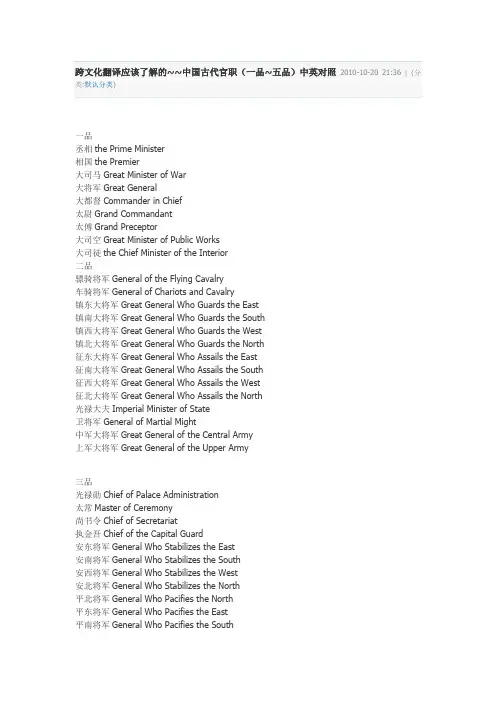
一品丞相the Prime Minister相国the Premier大司马Great Minister of War大将军Great General大都督Commander in Chief太尉Grand Commandant太傅Grand Preceptor大司空Great Minister of Public Works大司徒the Chief Minister of the Interior二品骠骑将军General of the Flying Cavalry车骑将军General of Chariots and Cavalry镇东大将军Great General Who Guards the East 镇南大将军Great General Who Guards the South 镇西大将军Great General Who Guards the West 镇北大将军Great General Who Guards the North 征东大将军Great General Who Assails the East 征南大将军Great General Who Assails the South 征西大将军Great General Who Assails the West 征北大将军Great General Who Assails the North 光禄大夫Imperial Minister of State卫将军General of Martial Might中军大将军Great General of the Central Army上军大将军Great General of the Upper Army三品光禄勋Chief of Palace Administration太常Master of Ceremony尚书令Chief of Secretariat执金吾Chief of the Capital Guard安东将军General Who Stabilizes the East安南将军General Who Stabilizes the South安西将军General Who Stabilizes the West安北将军General Who Stabilizes the North平北将军General Who Pacifies the North平东将军General Who Pacifies the East平南将军General Who Pacifies the South平西将军General Who Pacifies the West前将军General of the Forward Army后将军General of the Rear左将军General of the Left右将军General of the Right中领军Commandant of the Central Army四品御史中丞Imperial Minister中坚将军General Who is the Core of the Army骁骑将军General of Valiant Cavalry游击将军General of Guerrilla Warfare积弩将军General in Charge of the Production of Crossbows积射将军General in Charge of the Production of Bows城门校尉Commander Who Guards Gate典军中郎将Chief Imperial Corps Commander积弩都尉Commandant in Charge of the Production of Crossbows 持节都尉Commandant Who Holds Tallies副军中郎将Deputy Imperial Corps Commander典铠都尉Commandant in Charge of Amors抚军中郎将Imperial Corps Commander Who Uplifts the Army武卫中郎将Imperial Corps Commander of the Military Guard五品符节令Officer in Charge of Tallies鹰扬将军General Who Displays Owl’s Might折冲将军General Who Oppresses the Enemy with Ferocity伏波将军General Who Overcomes Adversity破虏将军General Who Eliminates Barbarians横海将军General Who Crosses the Ocean楼船将军General in Charge of Navy复土将军General Who Restores Territory牙门将军Garrison Commander偏将军Assistant General裨将军Deputy General。
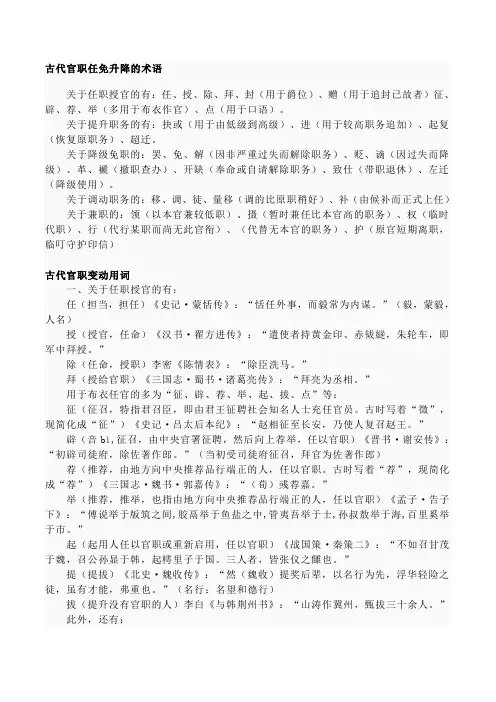
古代官职任免升降的术语关于任职授官的有:任、授、除、拜、封(用于爵位)、赠(用于追封已故者)征、辟、荐、举(多用于布衣作官)、点(用于口语)。
关于提升职务的有:抉或(用于由低级到高级)、进(用于较高职务追加)、起复(恢复原职务)、超迁。
关于降级免职的:罢、免、解(因非严重过失而解除职务)、贬、谪(因过失而降级)、革、褫(撤职查办)、开缺(奉命或自请解除职务)、致仕(带职退休)、左迁(降级使用)。
关于调动职务的:移、调、徒、量移(调的比原职稍好)、补(由候补而正式上任)关于兼职的:领(以本官兼较低职)、摄(暂时兼任比本官高的职务)、权(临时代职)、行(代行某职而尚无此官衔)、(代替无本官的职务)、护(原官短期离职,临叮守护印信)古代官职变动用词一、关于任职授官的有:任(担当,担任)《史记·蒙恬传》:“恬任外事,而毅常为内谋。
”(毅,蒙毅,人名)授(授官,任命)《汉书·翟方进传》:“遣使者持黄金印、赤韨縌,朱轮车,即军中拜授。
”除(任命,授职)李密《陈情表》:“除臣洗马。
”拜(授给官职)《三国志·蜀书·诸葛亮传》:“拜亮为丞相。
”用于布衣任官的多为“征、辟、荐、举、起、拔、点”等:征(征召,特指君召臣,即由君王征聘社会知名人士充任官员。
古时写着“徵”,现简化成“征”)《史记·吕太后本纪》:“赵相征至长安,乃使人复召赵王。
”辟(音bì,征召,由中央官署征聘,然后向上荐举,任以官职)《晋书·谢安传》:“初辟司徒府,除佐著作郎。
”(当初受司徒府征召,拜官为佐著作郎)荐(推荐,由地方向中央推荐品行端正的人,任以官职。
古时写着“荐”,现简化成“荐”)《三国志·魏书·郭嘉传》:“(荀)彧荐嘉。
”举(推荐,推举,也指由地方向中央推荐品行端正的人,任以官职)《孟子·告子下》:“傅说举于版筑之间,胶鬲举于鱼盐之中,管夷吾举于士,孙叔敖举于海,百里奚举于市。
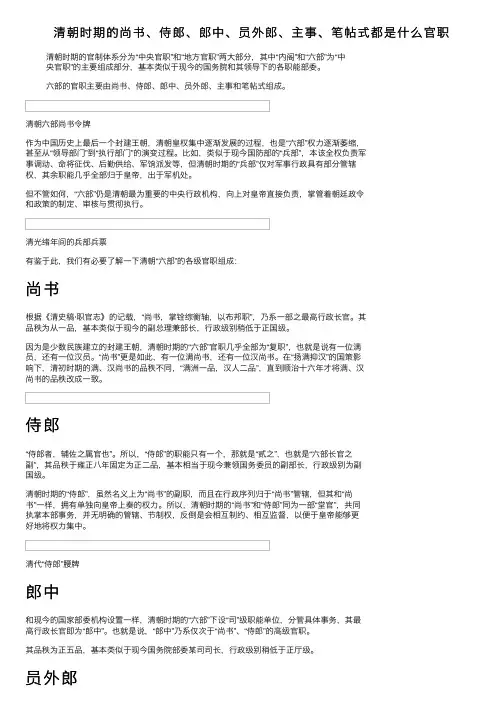
清朝时期的尚书、侍郎、郎中、员外郎、主事、笔帖式都是什么官职清朝时期的官制体系分为“中央官职”和“地⽅官职”两⼤部分,其中“内阁”和“六部”为“中央官职”的主要组成部分,基本类似于现今的国务院和其领导下的各职能部委。
六部的官职主要由尚书、侍郎、郎中、员外郎、主事和笔帖式组成。
清朝六部尚书令牌作为中国历史上最后⼀个封建王朝,清朝皇权集中逐渐发展的过程,也是“六部”权⼒逐渐萎缩,甚⾄从“领导部门”到“执⾏部门”的演变过程。
⽐如,类似于现今国防部的“兵部”,本该全权负责军事调动、命将征伐、后勤供给、军饷派发等,但清朝时期的“兵部”仅对军事⾏政具有部分管辖权,其余职能⼏乎全部归于皇帝,出于军机处。
但不管如何,“六部”仍是清朝最为重要的中央⾏政机构,向上对皇帝直接负责,掌管着朝廷政令和政策的制定、审核与贯彻执⾏。
清光绪年间的兵部兵票有鉴于此,我们有必要了解⼀下清朝“六部”的各级官职组成:尚书根据《清史稿·职官志》的记载,“尚书,掌铨综衡轴,以布邦职”,乃系⼀部之最⾼⾏政长官。
其品秩为从⼀品,基本类似于现今的副总理兼部长,⾏政级别稍低于正国级。
因为是少数民族建⽴的封建王朝,清朝时期的“六部”官职⼏乎全部为“复职”,也就是说有⼀位满员,还有⼀位汉员。
“尚书”更是如此,有⼀位满尚书,还有⼀位汉尚书。
在“扬满抑汉”的国策影响下,清初时期的满、汉尚书的品秩不同,“满洲⼀品,汉⼈⼆品”,直到顺治⼗六年才将满、汉尚书的品秩改成⼀致。
侍郎“侍郎者,辅佐之属官也”。
所以,“侍郎”的职能只有⼀个,那就是“贰之”,也就是“六部长官之副”,其品秩于雍正⼋年固定为正⼆品,基本相当于现今兼领国务委员的副部长,⾏政级别为副国级。
清朝时期的“侍郎”,虽然名义上为“尚书”的副职,⽽且在⾏政序列归于“尚书”管辖,但其和“尚书”⼀样,拥有单独向皇帝上奏的权⼒。
所以,清朝时期的“尚书”和“侍郎”同为⼀部“堂官”,共同执掌本部事务,并⽆明确的管辖、节制权,反倒是会相互制约、相互监督,以便于皇帝能够更好地将权⼒集中。
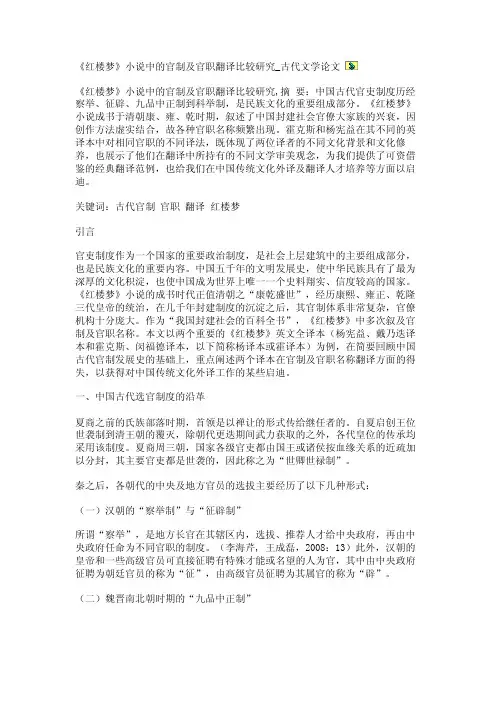
《红楼梦》小说中的官制及官职翻译比较研究_古代文学论文《红楼梦》小说中的官制及官职翻译比较研究,摘要:中国古代官吏制度历经察举、征辟、九品中正制到科举制,是民族文化的重要组成部分。
《红楼梦》小说成书于清朝康、雍、乾时期,叙述了中国封建社会官僚大家族的兴衰,因创作方法虚实结合,故各种官职名称频繁出现。
霍克斯和杨宪益在其不同的英译本中对相同官职的不同译法,既体现了两位译者的不同文化背景和文化修养,也展示了他们在翻译中所持有的不同文学审美观念,为我们提供了可资借鉴的经典翻译范例,也给我们在中国传统文化外译及翻译人才培养等方面以启迪。
关键词:古代官制官职翻译红楼梦引言官吏制度作为一个国家的重要政治制度,是社会上层建筑中的主要组成部分,也是民族文化的重要内容。
中国五千年的文明发展史,使中华民族具有了最为深厚的文化积淀,也使中国成为世界上唯一一个史料翔实、信度较高的国家。
《红楼梦》小说的成书时代正值清朝之“康乾盛世”,经历康熙、雍正、乾隆三代皇帝的统治,在几千年封建制度的沉淀之后,其官制体系非常复杂,官僚机构十分庞大。
作为“我国封建社会的百科全书”,《红楼梦》中多次叙及官制及官职名称。
本文以两个重要的《红楼梦》英文全译本(杨宪益、戴乃迭译本和霍克斯、闵福德译本,以下简称杨译本或霍译本)为例,在简要回顾中国古代官制发展史的基础上,重点阐述两个译本在官制及官职名称翻译方面的得失,以获得对中国传统文化外译工作的某些启迪。
一、中国古代选官制度的沿革夏商之前的氏族部落时期,首领是以禅让的形式传给继任者的。
自夏启创王位世袭制到清王朝的覆灭,除朝代更迭期间武力获取的之外,各代皇位的传承均采用该制度。
夏商周三朝,国家各级官吏都由国王或诸侯按血缘关系的近疏加以分封,其主要官吏都是世袭的,因此称之为“世卿世禄制”。
秦之后,各朝代的中央及地方官员的选拔主要经历了以下几种形式:(一)汉朝的“察举制”与“征辟制”所谓“察举”,是地方长官在其辖区内,选拔、推荐人才给中央政府,再由中央政府任命为不同官职的制度。
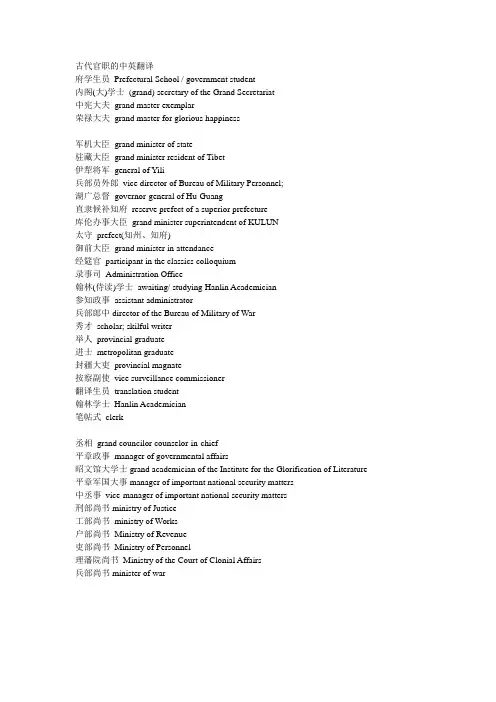
古代官职的中英翻译府学生员Prefectural School / government student内阁(大)学士(grand) secretary of the Grand Secretariat中宪大夫grand master exemplar荣禄大夫grand master for glorious happiness军机大臣grand minister of state驻藏大臣grand minister resident of Tibet伊犁将军general of Yili兵部员外郎vice director of Bureau of Military Personnel;湖广总督governor-general of Hu-Guang直隶候补知府reserve prefect of a superior prefecture库伦办事大臣grand minister superintendent of KULUN太守prefect(知州、知府)御前大臣grand minister in attendance经筵官participant in the classics colloquium录事司Administration Office翰林(侍读)学士awaiting/ studying Hanlin Academician参知政事assistant administrator兵部郎中director of the Bureau of Military of War秀才scholar; skilful writer举人provincial graduate进士metropolitan graduate封疆大吏provincial magnate按察副使vice surveillance commissioner翻译生员translation student翰林学士Hanlin Academician笔帖式clerk丞相grand councilor counselor-in-chief平章政事manager of governmental affairs昭文馆大学士grand academician of the Institute for the Glorification of Literature 平章军国大事manager of important national security matters中丞事vice-manager of important national security matters刑部尚书ministry of Justice工部尚书ministry of Works户部尚书Ministry of Revenue吏部尚书Ministry of Personnel理藩院尚书Ministry of the Court of Clonial Affairs兵部尚书minister of war。
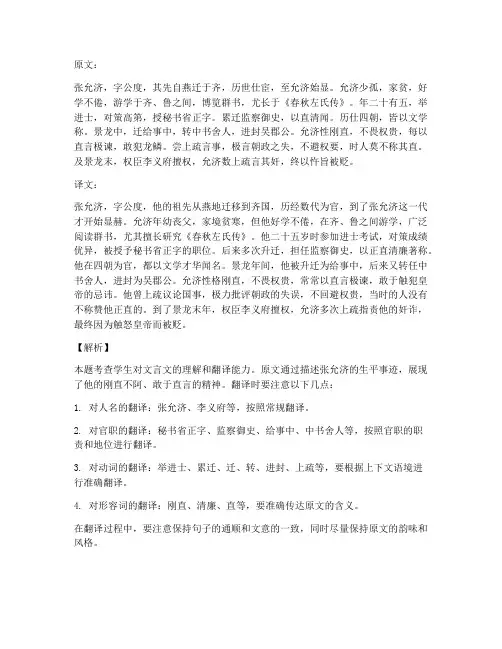
原文:张允济,字公度,其先自燕迁于齐,历世仕宦,至允济始显。
允济少孤,家贫,好学不倦,游学于齐、鲁之间,博览群书,尤长于《春秋左氏传》。
年二十有五,举进士,对策高第,授秘书省正字。
累迁监察御史,以直清闻。
历仕四朝,皆以文学称。
景龙中,迁给事中,转中书舍人,进封吴郡公。
允济性刚直,不畏权贵,每以直言极谏,敢犯龙鳞。
尝上疏言事,极言朝政之失,不避权要,时人莫不称其直。
及景龙末,权臣李义府擅权,允济数上疏言其奸,终以忤旨被贬。
译文:张允济,字公度,他的祖先从燕地迁移到齐国,历经数代为官,到了张允济这一代才开始显赫。
允济年幼丧父,家境贫寒,但他好学不倦,在齐、鲁之间游学,广泛阅读群书,尤其擅长研究《春秋左氏传》。
他二十五岁时参加进士考试,对策成绩优异,被授予秘书省正字的职位。
后来多次升迁,担任监察御史,以正直清廉著称。
他在四朝为官,都以文学才华闻名。
景龙年间,他被升迁为给事中,后来又转任中书舍人,进封为吴郡公。
允济性格刚直,不畏权贵,常常以直言极谏,敢于触犯皇帝的忌讳。
他曾上疏议论国事,极力批评朝政的失误,不回避权贵,当时的人没有不称赞他正直的。
到了景龙末年,权臣李义府擅权,允济多次上疏指责他的奸诈,最终因为触怒皇帝而被贬。
【解析】本题考查学生对文言文的理解和翻译能力。
原文通过描述张允济的生平事迹,展现了他的刚直不阿、敢于直言的精神。
翻译时要注意以下几点:1. 对人名的翻译:张允济、李义府等,按照常规翻译。
2. 对官职的翻译:秘书省正字、监察御史、给事中、中书舍人等,按照官职的职责和地位进行翻译。
3. 对动词的翻译:举进士、累迁、迁、转、进封、上疏等,要根据上下文语境进行准确翻译。
4. 对形容词的翻译:刚直、清廉、直等,要准确传达原文的含义。
在翻译过程中,要注意保持句子的通顺和文意的一致,同时尽量保持原文的韵味和风格。
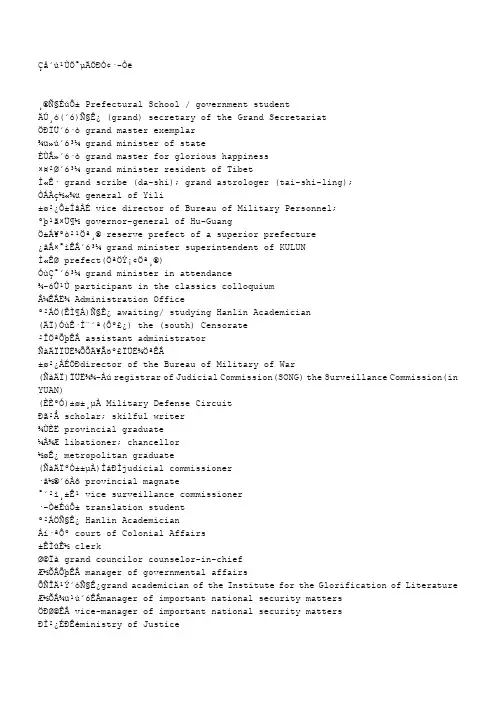
Çå´ú¹ÙÖ°µÄÖÐÓ¢·-Ò븮ѧÉúÔ± Prefectural School / government studentÄÚ¸ó(´ó)ѧʿ (grand) secretary of the Grand SecretariatÖÐÏÜ´ó·ò grand master exemplar¾ü»ú´ó³¼ grand minister of stateÈÙ»´ó·ò grand master for glorious happinessפ²Ø´ó³¼ grand minister resident of TibetÌ«Ê· grand scribe (da-shi); grand astrologer (tai-shi-ling);ÒÁÀ罫¾ü general of Yili±ø²¿Ô±ÍâÀÉ vice director of Bureau of Military Personnel;ºþ¹ã×ܶ½ governor-general of Hu-GuangÖ±Á¥ºò²¹Öª¸® reserve prefect of a superior prefecture¿âÂ×°ìÊÂ´ó³¼ grand minister superintendent of KULUNÌ«ÊØ prefect(ÖªÖÝ¡¢Öª¸®)ÓùÇ°´ó³¼ grand minister in attendance¾-óÛ¹Ù participant in the classics colloquium¼ÊÂ˾ Administration Officeº²ÁÖ(Ê̶Á)ѧʿ awaiting/ studying Hanlin Academician(ÄÏ)Óùʷ̨´ª(Ôº£¿) the (south) Censorate²ÎÖªÕþÊ assistant administratorÑàÄÏÏÜ˾ÕÕÄ¥Ãöº£ÏÜ˾֪ʱø²¿ÀÉÖÐdirector of the Bureau of Military of War(ÑàÄÏ)ÏÜ˾¾-Àú registrar of Judicial Commission(SONG) the Surveillance Commission(in YUAN)(ÈȺÓ)±ø±¸µÀ Military Defense CircuitÐã²Å scholar; skilful writer¾ÙÈË provincial graduate¼À¾Æ libationer; chancellor½øÊ¿ metropolitan graduate(ÑàÄϺӱ±µÀ)ÌáÐÌjudicial commissioner·â½®´óÀô provincial magnate°´²ì¸±Ê¹ vice surveillance commissioner·-ÒëÉúÔ± translation studentº²ÁÖѧʿ Hanlin AcademicianÀí·ªÔº court of Colonial Affairs±ÊÌûʽ clerkØ©Ïà grand councilor counselor-in-chiefƽÕÂÕþÊ manager of governmental affairsÕÑÎĹݴóѧʿgrand academician of the Institute for the Glorification of Literature ƽÕ¾ü¹ú´óÊÂmanager of important national security mattersÖÐØ©Ê vice-manager of important national security mattersÐ̲¿ÉÐÊéministry of Justice¹¤²¿ÉÐÊé ministry of Works»§²¿ÉÐÊé Ministry of RevenueÀô²¿ÉÐÊé Ministry of PersonnelÀí·ªÔºÉÐÊé Ministry of the Court of Clonial Affairs ±ø²¿ÉÐÊéminister of war。
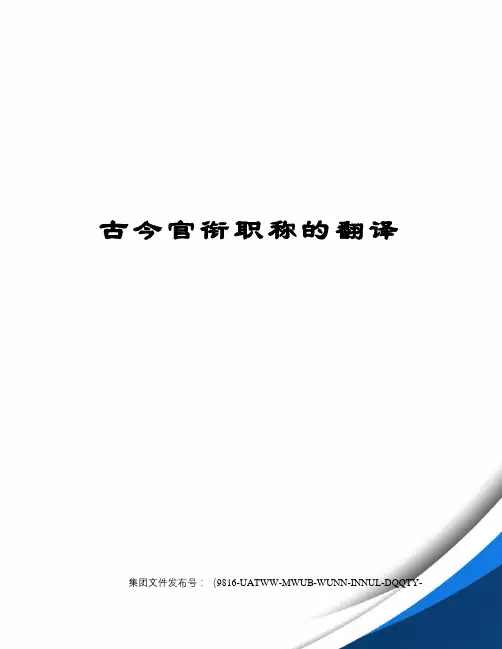
古今官衔职称的翻译集团文件发布号:(9816-UATWW-MWUB-WUNN-INNUL-DQQTY-现代官衔职称的翻译1 正职头衔翻译法1) 用chief表示的职衔总司令 Commander-in-chief总编辑 Editor-in-chief总参谋长 Chief of General Staff 总工程师 Chief Engineer总会计师 Chief Account总建筑师 Chief Architect总裁判 Chief Referee图书馆馆长 Chief Librarian首席法官 Chief Judge检察长 Chief Procurator(Procurator ate 检察院)总裁/首席执行官 Chief Executive Officer(CEO)首席财务官 Chief Financial Officer(CFO)首席记者 Chief Correspondent首席谈判代表 Chief Negotiator部 Ministry司厅/局/处/科长 Chief/Head of theDepartment/Bureau/Division/Section县/区/乡/镇长 Country/District/Township/Town Chief/Head 2) 用general表示的职衔总书记 General Secretary检察长 Procurator-general审计长 Auditor-general秘书长 Secretary-general总领事 Consul-general(consulate 领事馆/ambassador 大使/embassy 大使馆)总经理 General Manager3) 用head来表示的职衔总教练 Head Coach总厨 Head Chef护士长 Head Nurse村长 Village Head列车长 Head of a Train Crew4) 用president表示的职衔国家主席 President中国科学院院长 President of the Chinese Academy of Science最高人民法院院长President of the Supreme People’s Court(大学)校长 President中国人民银行行长President/Governor of the Chinese People’s Bank协会/学会/理事会会长 President of anassociation/society/council5) 用chairman表示的职衔人大常委会委员长 NPC Chairman政治协商会议主席 CPPCC Chairman中央军委主席 Chairman of the Central Military Commission政党主席 Chairman of a Political Party公司董事长 Chairman of the Board of Directors大学系主任 Chairman/Dean/Head of a department6) 用director表示的职衔总政治部主任 Director of the General Political Department办公厅主任 Director of the General Office亚洲司司长 Director of the Department of Asian Affairs人民日报社社长Director of the People’s Daily编译局局长 Director of the Compilation and Translation Bureau研究所所长 Director of a research institute 博物馆馆长 Director of a museum7) 用commissioner表示的职衔行/公署专员 Commissioner自治州州长 Commissioner公安局局长 Police Commissioner8) 用commander表示的职衔执行主席 Executive Chairman行政/执行秘书 Executive Secretary9) 用senior表示的职衔高级工程师 Senior Engineer高级编辑 Senior Editor高级讲师 Senior Lecturer10) 用executive表示的职衔执行主席 Executive Chairman执行秘书 Executive Secretary11) 其他总理 Premier(中);Prime Minister国务委员 State Councilor(State Council 国务院)部长 Minister省长 Provincial Governor顾问 Advisor2 副职头衔翻译法1) 与前缀vice搭配的头衔(president, premier, chairman, minister, governor…)副主席 Vice Chairman副总理 Vice Premier副部长 Vice Minister副领事 Vice Consul副省长 Vice Governor副校长 Vice Principal2) 与前缀Deputy搭配的职衔(chief, head, mayor, director)副市长 Deputy/Vice Mayor副书记 Deputy Secretary副秘书长 Deputy Secretary-general副检察长 Deputy Chief Procurator副参谋长 Deputy Chief of Staff副处/科长 Deputy Division/Section Chief3) 与前缀Associate搭配的职衔副教授 Associate Professor副研究员 Associate Research Fellow3 “兼”“代理”“名誉”的翻译方法1) “兼”的翻译方法:在主职和兼职之间加上and concurrently上海市委书记兼市长 Party Secretary and Concurrently Mayor of Shanghai2) “代理”用acting代主席 Acting President3) “名誉”有时用honorary,有时用emeritus(荣誉退休的)名誉主席 Honorary Chairman名誉校长 Emeritus President中国古代官职1品到5品翻译一品丞相the Prime Minister相国the Premier大司马Great Minister of War大将军Great General大都督Commander in Chief太尉Grand Commandant太傅Grand Preceptor大司空Great Minister of Public Works大司徒the Chief Minister of the Interior二品骠骑将军General of the Flying Cavalry车骑将军General of Chariots and Cavalry镇东大将军Great General Who Guards the East 镇南大将军Great General Who Guards the South 镇西大将军Great General Who Guards the West 镇北大将军Great General Who Guards the North 征东大将军Great General Who Assails the East 征南大将军Great General Who Assails the South 征西大将军Great General Who Assails the West 征北大将军Great General Who Assails the North 光禄大夫Imperial Minister of State卫将军General of Martial Might中军大将军Great General of the Central Army 上军大将军Great General of the Upper Army三品光禄勋Chief of Palace Administration太常Master of Ceremony尚书令Chief of Secretariat执金吾Chief of the Capital Guard安东将军General Who Stabilizes the East安南将军General Who Stabilizes the South安西将军General Who Stabilizes the West安北将军General Who Stabilizes the North平北将军General Who Pacifies the North平东将军General Who Pacifies the East平南将军General Who Pacifies the South平西将军General Who Pacifies the West前将军General of the Forward Army后将军General of the Rear左将军General of the Left右将军General of the Right中领军Commandant of the Central Army四品御史中丞Imperial Minister中坚将军General Who is the Core of the Army骁骑将军General of Valiant Cavalry游击将军General of Guerrilla Warfare积弩将军General in Charge of the Production of Crossbows 积射将军General in Charge of the Production of Bows城门校尉Commander Who Guards Gate典军中郎将Chief Imperial Corps Commander积弩都尉Commandant in Charge of the Production of Crossbows 持节都尉Commandant Who Holds Tallies副军中郎将Deputy Imperial Corps Commander典铠都尉Commandant in Charge of Amors抚军中郎将 Imperial Corps Commander Who Uplifts the Army武卫中郎将Imperial Corps Commander of the Military Guard五品符节令 Officer in Charge of Tallies鹰扬将军General Who D isplays Owl’s Might折冲将军General Who Oppresses the Enemy with Ferocity伏波将军General Who Overcomes Adversity破虏将军General Who Eliminates Barbarians横海将军General Who Crosses the Ocean楼船将军General in Charge of Navy复土将军General Who Restores Territory牙门将军Garrison Commander偏将军Assistant General裨将军Deputy General。
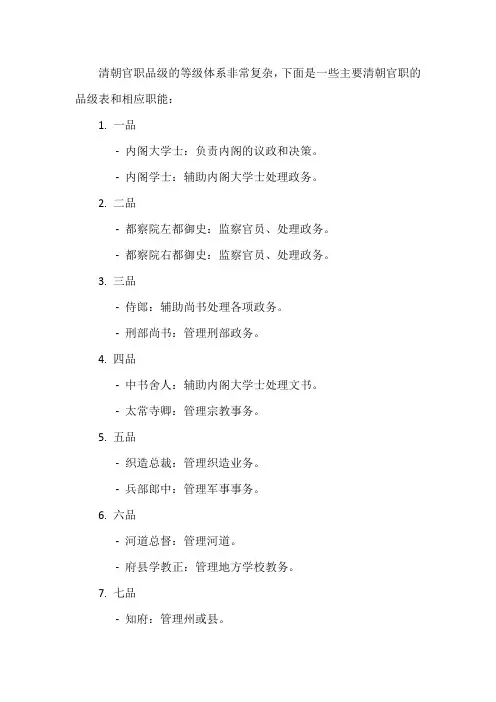
清朝官职品级的等级体系非常复杂,下面是一些主要清朝官职的品级表和相应职能:
1. 一品
-内阁大学士:负责内阁的议政和决策。
-内阁学士:辅助内阁大学士处理政务。
2. 二品
-都察院左都御史:监察官员、处理政务。
-都察院右都御史:监察官员、处理政务。
3. 三品
-侍郎:辅助尚书处理各项政务。
-刑部尚书:管理刑部政务。
4. 四品
-中书舍人:辅助内阁大学士处理文书。
-太常寺卿:管理宗教事务。
5. 五品
-织造总裁:管理织造业务。
-兵部郎中:管理军事事务。
6. 六品
-河道总督:管理河道。
-府县学教正:管理地方学校教务。
7. 七品
-知府:管理州或县。
-筵官:管理宴席。
8. 八品
-绍兴知府:管理绍兴州。
-廉访使:负责廉政监察。
9. 九品
-郡县令:管理县区事务。
-乡试考官:负责乡试考核。
以上仅是部分官职等级及职能,清朝的官职体系非常庞大,还有许多其他官职等级及其职能。
由于清代政治体制复杂,官职等级体系也相对较为复杂。
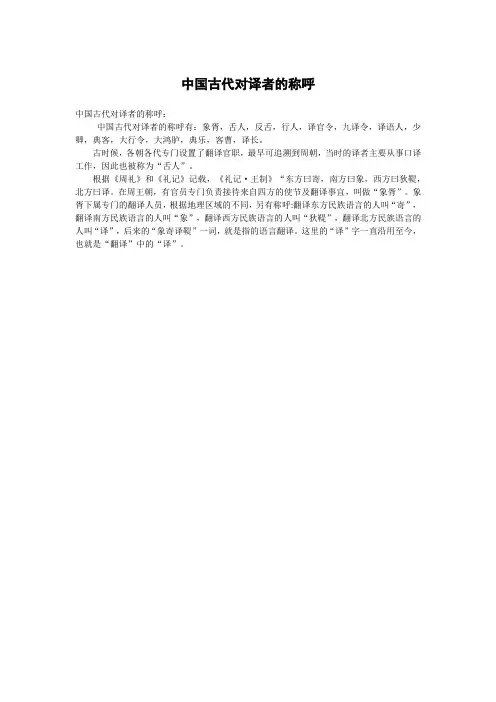
中国古代对译者的称呼
中国古代对译者的称呼:
中国古代对译者的称呼有:象胥,舌人,反舌,行人,译官令,九译令,译语人,少卿,典客,大行令,大鸿胪,典乐,客曹,译长。
古时候,各朝各代专门设置了翻译官职,最早可追溯到周朝,当时的译者主要从事口译工作,因此也被称为“舌人”。
根据《周礼》和《礼记》记载,《礼记·王制》“东方曰寄,南方曰象,西方曰狄鞮,北方曰译。
在周王朝,有官员专门负责接待来自四方的使节及翻译事宜,叫做“象胥”。
象胥下属专门的翻译人员,根据地理区域的不同,另有称呼:翻译东方民族语言的人叫“寄”,翻译南方民族语言的人叫“象”,翻译西方民族语言的人叫“狄鞮”,翻译北方民族语言的人叫“译”,后来的“象寄译鞮”一词,就是指的语言翻译。
这里的“译”字一直沿用至今,也就是“翻译”中的“译”。
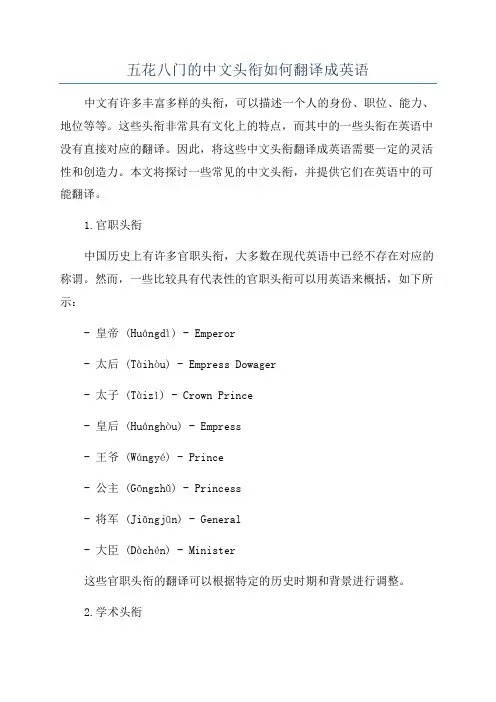
五花八门的中文头衔如何翻译成英语中文有许多丰富多样的头衔,可以描述一个人的身份、职位、能力、地位等等。
这些头衔非常具有文化上的特点,而其中的一些头衔在英语中没有直接对应的翻译。
因此,将这些中文头衔翻译成英语需要一定的灵活性和创造力。
本文将探讨一些常见的中文头衔,并提供它们在英语中的可能翻译。
1.官职头衔中国历史上有许多官职头衔,大多数在现代英语中已经不存在对应的称谓。
然而,一些比较具有代表性的官职头衔可以用英语来概括,如下所示:- 皇帝(Huángdì) - Emperor- 太后(Tàihòu) - Empress Dowager- 太子(Tàizǐ) - Crown Prince- 皇后(Huánghòu) - Empress- 王爷(Wángyé) - Prince- 公主(Gōngzhǔ) - Princess- 将军(Jiāngjūn) - General- 大臣(Dàchén) - Minister这些官职头衔的翻译可以根据特定的历史时期和背景进行调整。
2.学术头衔学术头衔在中文中用于描述一人在学术领域的职位、荣誉和资格。
以下是一些在中英两种语言中常见的学术头衔及其对应的翻译:- 教授(Jiàoshòu) - Professor- 副教授(Fùjiàoshòu) - Associate Professor- 博士(Bóshì) - Doctor- 博士后(Bóshìhòu) - Postdoctoral Fellow- 研究员(Yánjiūyuán) - Researcher- 教育家(Jiàoyùjiā) - Educator- 院士(Yuànshì) - Academician- 进士(Jìnshì) - Jinshi Degree Holder (a title in ancient China)3.荣誉头衔荣誉头衔通常是用于表示尊重和认可,给予个人或组织的特殊称号。
丞相the Prime Minister相国the Premier大司马Great Minister of War大将军Great General大都督Commander in Chief太尉Grand Commandant太傅Grand Preceptor大司空Great Minister of Public Works大司徒the Chief Minister of the Interior二品骠骑将军General of the Flying Cavalry车骑将军General of Chariots and Cavalry镇东大将军Great General Who Guards the East 镇南大将军Great General Who Guards the South 镇西大将军Great General Who Guards the West 镇北大将军Great General Who Guards the North 征东大将军Great General Who Assails the East 征南大将军Great General Who Assails the South 征西大将军Great General Who Assails the West 征北大将军Great General Who Assails the North 光禄大夫Imperial Minister of State卫将军General of Martial Might中军大将军Great General of the Central Army上军大将军Great General of the Upper Army三品光禄勋Chief of Palace Administration太常Master of Ceremony尚书令Chief of Secretariat执金吾Chief of the Capital Guard安东将军General Who Stabilizes the East安南将军General Who Stabilizes the South安西将军General Who Stabilizes the West安北将军General Who Stabilizes the North平北将军General Who Pacifies the North平东将军General Who Pacifies the East平南将军General Who Pacifies the South平西将军General Who Pacifies the West前将军General of the Forward Army后将军General of the Rear左将军General of the Left右将军General of the Right中领军Commandant of the Central Army御史中丞Imperial Minister中坚将军General Who is the Core of the Army骁骑将军General of Valiant Cavalry游击将军General of Guerrilla Warfare积弩将军General in Charge of the Production of Crossbows积射将军General in Charge of the Production of Bows城门校尉Commander Who Guards Gate典军中郎将Chief Imperial Corps Commander积弩都尉Commandant in Charge of the Production of Crossbows 持节都尉Commandant Who Holds Tallies副军中郎将Deputy Imperial Corps Commander典铠都尉Commandant in Charge of Amors抚军中郎将Imperial Corps Commander Who Uplifts the Army武卫中郎将Imperial Corps Commander of the Military Guard五品符节令Officer in Charge of Tallies鹰扬将军General Who Displays Owl’s Might折冲将军General Who Oppresses the Enemy with Ferocity伏波将军General Who Overcomes Adversity破虏将军General Who Eliminates Barbarians横海将军General Who Crosses the Ocean楼船将军General in Charge of Navy复土将军General Who Restores Territory牙门将军Garrison Commander偏将军Assistant General裨将军Deputy General。
高考文言文翻译常用词总结一、科举:贡举:古时地方向朝廷荐举人才(举荐科目:孝、廉),指科举考试。
第:科举考试及格的等次,即考中。
登第:登科,科举考中进士。
进士:通过最后一级考试殿试者,称为进士。
中第:科举考试及格。
落第、下第:科举时代指殿试或乡试没考中。
状元:殿试第一称状元。
会元:会试第一称会元。
解元:乡试第一称解元。
乡试:科举时代,每三年,由朝廷选派考官,在各省省城举行一次选拔人才的考试。
二、官职:1.表官职的宰相:总揽政务的大官。
宰,主持,相,辅佐。
御史大夫:其权力仅次丞相。
六部:吏、户、礼、兵、刑、工。
三司:太尉,司徒、司空。
中书省:中央行政机要机关。
尚书:六部最高行政长官。
太尉:军事首脑。
郎中:尚书属下部员。
宦官:宫廷内侍,又称太监。
侍郎侍中:宫廷侍卫。
校尉:汉代军事长官。
翰林学士:管文件,图书,侍读。
太史:记史,管文书。
国子监:中央教育机构。
左右拾遗:唐代谏官。
总督:清代地方最高行政长官。
巡抚:总揽一省行政军事长官。
知州:州一级行政长官。
知,管理。
太守:郡一级行政长官。
主簿:秘书。
2.表官职变化的①表授予官职的词语征:由皇帝征聘社会知名人士充任官职。
如公车特征拜郎中。
辟:由中央官署征聘,然后向上荐举,任以官职。
如连辟公府不就。
举:由地方官向中央举荐品行端正的人,任以官职。
如举其偏,不为党。
荐:韩琦镇长安,荐知(主持,掌管)泾阳县。
拜:授予官职。
如安帝雅闻衡善术学,公车征拜郎中。
选:通过推荐或科举选拔任以官职。
如延、至治间……选丞相东曹掾。
除:任命,授职。
如寻蒙国恩,除臣冼马。
授:授给、给予官职。
如秦定初恩授东平路儒学教授。
赏:指皇帝特意赐给官衔或爵位。
如八月初一,上召见袁世凯,特赏侍郎。
封:指帝王将爵位或土地赐给臣子。
如劳苦而功高如此,未有封侯之赏。
起:起用人任以官职。
如鲁居丧服阕,起为太医都事。
察:考察后予推荐,选举。
如郡察孝廉,州举茂才。
仕:做官。
如学而优则仕。
仕宦:做官,任官职。
浅析典籍英译中的官职翻译作者:王慧霞来源:《大东方》2016年第01期摘要:本文主要探讨典籍英译中的官职翻译,简要分析译者在进行官职翻译时的困顿之处。
笔者从杨宪益、戴乃迭的系列译作出发,对其译作中的官职翻译进行整理和归纳,并结合自身所学知识,就此问题提出若干解决之法。
关键词:典籍英译;官职翻译;现状;解决方法1 典籍翻译中官职翻译的现状译者在翻译官职时,通常会采取欧洲官职系统中相似的职位来替代中国的官职,或者对官职翻译进行模糊化处理,又或者直接省略不译。
这几种方法有其可取之处,但其中的尺度往往很难拿捏。
笔者以杨氏夫妇在不同典籍中对“丞相”这一官职名称的翻译为例,简要阐明译者在处理官职翻译时的诸多考量及不易之处。
例1:复有呼曰:“右相且至。
”(《唐代传奇选》)Presently it was announced that the Prime Minister had arrived.例2:右丞相去疾、左丞相斯、将军冯劫进谏曰:“关东群盗并起,秦发兵诛击,所杀亡甚众,然犹不止……”(《史记选》)The junior prime minster Feng Quji, the senior prime minister Li Si and General Feng Jie asked for an audience and told the emperor,“Brigands are rife east of the Pass and, although our government troops have suppressed and killed a great many of them, they are not y et wiped out…”上文所举的两个例子,均涉及到了右丞相这一官职。
例1:将“右相”翻译为“Prime Minister”,第二个例子译为“junior prime minster”。
中国历代官职及历代官职解释中央职官:商王廷设有百官,辅佐商王治理国家。
百官之中可分为政务官、宗教官和事务官三类。
政务官、宗教官的地位很高,权力很大。
周朝的官制在商朝的基础上更加发展,形成了一套庞大的官僚组织和较完整的官僚制度。
辅佐周王进行统治的有太师、太傅、太保),其权力很大,是国家的总管。
协助周王处理政务的最高官职是六卿,即太宰、太宗、太史、太祝、太士、太卜。
太宰是朝廷的政务总管,太宗管宗庙谱系,太史管起草文告、编写史书,太祝是最大祭祀官,太卜是占筮官,太士是神职官吏。
此外,周朝还设有司徒、司马、司空、司士、司寇等五司,分别掌管土地、军赋、工程、群臣爵禄、刑罚等。
商周的王、诸侯、卿大夫及其他各种官吏都是世袭的,世代掌握着统治大权,这就是所谓世卿制度。
春秋时期由于诸侯间强凌弱,大并小,互相间进行无休止的兼并争霸,周王朝对诸侯逐渐失去控制的权力,贵族分封制度行不通,各诸侯国称王称霸,设官分职,各行其是,职官制度也因而发生了变化。
秦灭六国,建立了我国历史上第一个统一的专制主义中央集权的国家,确定了皇帝至高无上的权力,并建立了“三公”即丞相、太尉、御史大夫,丞相负责辅佐皇帝处理全国事务,是皇帝的助手。
太尉协助皇帝掌管全国军队。
御史大夫掌图籍章奏,监察百官。
三公之间互不统属,直接对皇帝负责。
“治粟内史,掌管国家财政税收?r奉常,掌管宗庙祭祀礼仪?r典客,处理国内各少数民族事务和对外关系?r郎中令,掌管皇帝的侍从警卫?r少府,掌管供皇室需要的山海地泽收入和官府手工业?r卫尉,掌管宫廷警卫?r太仆,掌管宫廷车马;宗正,掌管皇帝宗族事务。
三公九卿均由皇帝任免调动,不得世袭。
大司徒、大司空、大司马,亦称“三公”(又称“三司”)。
原来御史大夫的属官“中丞”保留下来,专司监察,以后称为“御史台”,中国历史上专职的监察机构,从此正式建立起来。
到了东汉,正式发号施令的是尚书台,三公的权力削弱,只能办理一些例行公事。
东汉末,曹操为了掌握大权,自任丞相,并一度恢复御史大夫等官职。
清代官职的中英翻译府学生员 Prefectural School / government student内阁(大)学士 (grand) secretary of the Grand Secretariat中宪大夫 grand master exemplar军机大臣 grand minister of state荣禄大夫 grand master for glorious happiness驻藏大臣 grand minister resident of Tibet太史 grand scribe (da-shi); grand astrologer (tai-shi-ling);伊犁将军 general of Yili兵部员外郎 vice director of Bureau of Military Personnel;湖广总督 governor-general of Hu-Guang直隶候补知府 reserve prefect of a superior prefecture库伦办事大臣 grand minister superintendent of KULUN太守 prefect(知州、知府)御前大臣 grand minister in attendance经筵官 participant in the classics colloquium录事司 Administration Office翰林(侍读)学士 awaiting/ studying Hanlin Academician(南)御史台椽(院?) the (south) Censorate参知政事 assistant administrator燕南宪司照磨闽海宪司知事兵部郎中director of the Bureau of Military of War(燕南)宪司经历registrar of Judicial Commission(SONG) the Surveillance Commission(in YUAN)(热河)兵备道 Military Defense Circuit秀才 scholar; skilful writer举人 provincial graduate祭酒 libationer; chancellor进士 metropolitan graduate(燕南河北道)提刑judicial commissioner封疆大吏 provincial magnate按察副使 vice surveillance commissioner翻译生员 translation student翰林学士 Hanlin Academician理藩院 court of Colonial Affairs笔帖式 clerk丞相 grand councilor counselor-in-chief平章政事 manager of governmental affairs昭文馆大学士grand academician of the Institute for the Glorification of Literature 平章军国大事manager of important national security matters中丞事 vice-manager of important national security matters刑部尚书ministry of Justice工部尚书 ministry of Works户部尚书 Ministry of Revenue吏部尚书 Ministry of Personnel理藩院尚书 Ministry of the Court of Clonial Affairs 兵部尚书minister of war。
府学生员Prefectural School / government student
内阁(大)学士(grand) secretary of the Grand Secretariat
中宪大夫grand master exemplar
军机大臣grand minister of state
荣禄大夫grand master for glorious happiness
驻藏大臣grand minister resident of Tibet
太史grand scribe (da-shi); grand astrologer (tai-shi-ling);
伊犁将军general of Yili
兵部员外郎vice director of Bureau of Military Personnel;
湖广总督governor-general of Hu-Guang
直隶候补知府reserve prefect of a superior prefecture
库伦办事大臣grand minister superintendent of KULUN
太守prefect(知州、知府)
御前大臣grand minister in attendance
经筵官participant in the classics colloquium
录事司Administration Office
翰林(侍读)学士awaiting/ studying Hanlin Academician
(南)御史台椽(院?) the (south) Censorate
参知政事assistant administrator
燕南宪司照磨闽海宪司知事
兵部郎中director of the Bureau of Military of War
(燕南)宪司经历registrar of Judicial Commission(SONG) ; the Surveillance Commission(in YUAN)
(热河)兵备道Military Defense Circuit
秀才scholar; skilful writer
举人provincial graduate
祭酒libationer; chancellor
进士metropolitan graduate
(燕南河北道)提刑judicial commissioner
封疆大吏provincial magnate
按察副使vice surveillance commissioner
翻译生员translation student
翰林学士Hanlin Academician
理藩院court of Colonial Affairs
笔帖式clerk
丞相grand councilor ; counselor-in-chief
平章政事manager of governmental affairs
昭文馆大学士grand academician of the Institute for the Glorification of Literature
平章军国大事manager of important national security matters
中丞事vice-manager of important national security matters
刑部尚书ministry of Justice
工部尚书ministry of Works
户部尚书Ministry of Revenue
吏部尚书Ministry of Personnel
理藩院尚书Ministry of the Court of Clonial Affairs 兵部尚书minister of war。